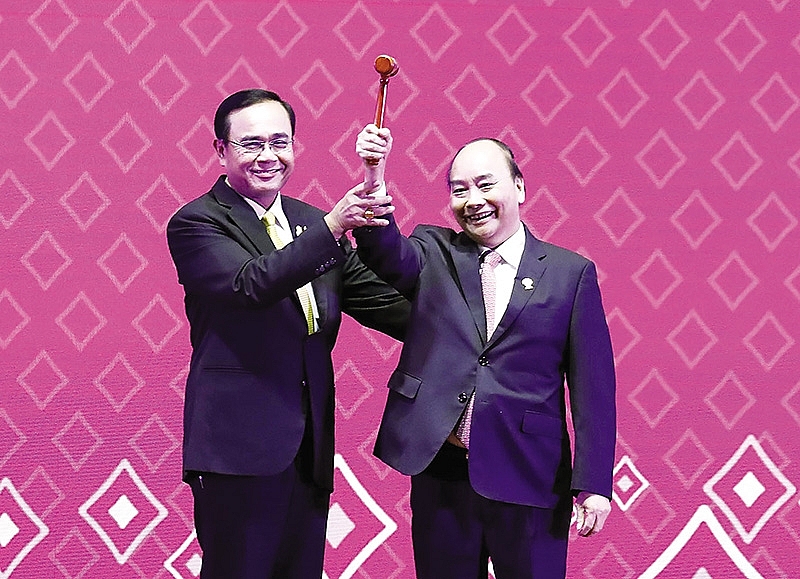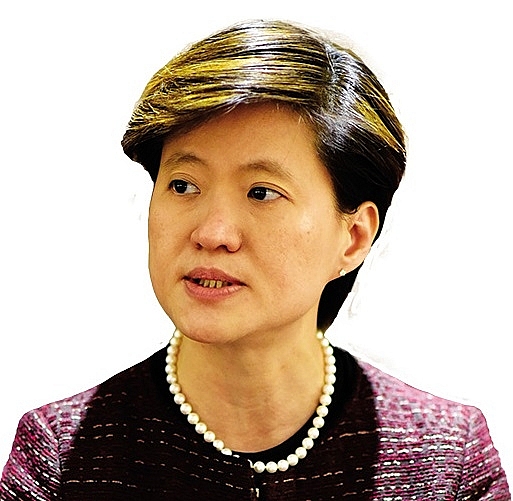Vietnam all set for crucial ASEAN role
 |
| Prime Minister Nguyen Xuan Phuc (right) was handed the symbolic gavel from Thailand’s counterpart Prayut Chan-o-cha in Bangkok |
As the 35th ASEAN Summit and related events in Bangkok wrapped up last week, Prime Minister Nguyen Xuan Phuc received the symbolic gavel from Thai counterpart Prayut Chan-o-cha in a handover ceremony, symbolising that Vietnam will assume the rotating chair of the ASEAN for 2020. Previously, the country held the responsibility in 1998 and 2010.
The chairmanship will formally begin on January 1 next year. During the one-year tenure, Vietnam will be tasked with outlining orientations for the regional bloc to enhance connectivity, cohesiveness, and overcome challenges.
PM Phuc stated, “Along with achievements created by the ASEAN Community over past years, positive results of the ASEAN in 2019 under the theme of “Advancing Partnership for Sustainability” will lay a favourable foundation for Vietnam to take over the ASEAN chairmanship for 2020, a year which is very important to both the ASEAN and Vietnam.”
He underlined the need to further strengthen the bloc’s solidarity via shared values, a sense of community and responsibility, and benefits under the same house of the ASEAN.
“We will study the three C’s of continuity, complementarity, and creativity which were initiated by Thai Prime Minister Chan-o-cha to further boost ASEAN development,” PM Phuc said.
According to the Vietnamese prime minister, in the context of regional connectivity and boosting construction of the community, it is more important than ever for the ASEAN to further cement its solidarity, which comes from the maintenance of shared benefits in strategies and economic affairs among the bloc’s state members, and the maintenance of the community colours among ASEAN citizens.
Vietnam also advanced the official theme of the 2020 ASEAN year – “Cohesive and Responsive” – which received the thumbs-up from member states.
“Being cohesive and responsive complement each other. A cohesive and developed community would need increased active response to external factors and, vice versa, the ability in active response can be achieved if the ASEAN is a close cohesive bloc,” PM Phuc stressed.
“Vietnam looks forward to receiving support and active assistance from the ASEAN member states and the bloc’s partners in order to materialise the theme for the 2020 ASEAN year,” he continued.
PM Phuc said that the ASEAN Community has been growing strongly and firmly for more than five decades, and the time is now for member states to renew their mindset and take action as a closely-cohesive united entity in order to take the initiative in effectively responding to, and sustainably developing in, a continuously changing world.
“Let’s think at the community level and take action for the community. Welcome to Vietnam in the 2020 ASEAN year,” stated PM Phuc.
According to ASEAN Secretary General Lim Jock Hoi, countries have high hopes for Vietnam’s ASEAN chairmanship next year.
He said that Vietnam has progressed well for the last 15 years, with economic growth having hit an average of 7 per cent annually, and the country is one of the major economies now in the entire bloc.
“We think that the secretariat will work closely with the Vietnamese chair next year in order to develop the programmes we have already indicated. We look forward to Vietnam’s chairmanship and we are sure that Vietnam will also be looking forward to it,” Hoi stated.
In 2020, the ASEAN will be half-way to completing a master plan on building the ASEAN Community by 2025. Holding the ASEAN chairmanship in 2020 will be of great importance to reviewing the bloc’s performance and devising future orientations.
Following its successful ASEAN chairmanship 10 years ago, Vietnam is confident it will fulfil all duties next year and meet the expectations of the other ASEAN member states, according to the Vietnamese Ministry of Foreign Affairs.
Statistics from the Ministry of Planning and Investment showed that as of October 20, total investment from ASEAN member states in Vietnam hit $74.12 billion, with Singaporean investment standing at over $49.9 billion, Thailand at $10.8 billion, Malaysia with $12.6 billion, Indonesia with $579 million, and the Philippines at $276 million.
According to the General Statistics Office, Southeast Asia is now Vietnam’s fourth-largest export market after the US, the EU, and China. Vietnam’s export turnover from the region surged from under $1 billion in 1995 to $21.7 billion in 2017, $24.7 billion last year, and $21.3 billion in the first 10 months of this year, up 2.6 per cent on-year.
As one of the main pillars of the ASEAN, the ASEAN Economic Community aims to create a tariff-free zone with zero tariffs on all traded goods and services, while setting a timetable for removal of non-tariff barriers region-wide.
The ASEAN groups together Brunei, Cambodia, Indonesia, Laos, Malaysia, Myanmar, the Philippines, Singapore, Thailand, and Vietnam. The bloc’s partners include China, Japan, South Korea, India, Australia, New Zealand, the US, and Russia.
| Catherine Wong - Singaporean Ambassador to Vietnam
I am confident that Vietnam will be an excellent host in 2020. Vietnam’s chairmanship will mark the 25th anniversary of its entry into the ASEAN. Over the years, Vietnam has consistently been a strong proponent of the ASEAN, and actively contributed to its unity, centrality, and various practical initiatives. Prime Minister Nguyen Xuan Phuc launched Vietnam’s National ASEAN 2020 Committee last year, and preparations are well underway. Vietnam has experience hosting major international events, such as the second US-DPRK Summit, the World Economic Forum on ASEAN last September, and various APEC events in 2017 including the APEC Economic Leaders’ Meeting. The ASEAN is a key pillar of peace, security, and prosperity, and it has made good progress in recent years. We have much to be proud of; however, we are living in increasingly uncertain times. The world order is evolving, bringing about new challenges and opportunities for the ASEAN. The region is facing cross-border issues posed by climate change, trade protectionism, pollution, terrorism, and cyber-attacks, and these require collective action. ASEAN member states have been working together to stay relevant and address these challenges, while also maintaining the ASEAN’s unity and centrality. Against this backdrop, the ASEAN has taken steps to reinforce the open and rules-based multilateral order in the region. Strengthening regional economic integration has been another priority, for instance through the ASEAN Economic Community and the ASEAN Single Window. In recent years, we have leveraged the digital economy and technology to deepen our integration, such as through e-commerce and the ASEAN Smart City Network (ASCN). Singapore looks forward to supporting Vietnam’s chairmanship of the ASEAN in 2020, and its efforts to strengthen the bloc. Singapore and Vietnam share a close strategic partnership that is underpinned by robust links across governments, peoples, and businesses. Within the ASEAN, our two countries have many shared interests and we co-operate on many aspects. Hence, our co-operation in the ASEAN reinforces our bilateral relations. For instance, the ASCN has presented new opportunities for Singapore to share our experiences in building our smart nation with our Vietnamese friends, particularly those from Vietnam’s ASCN pilot cities including Hanoi, Danang, and Ho Chi Minh City. Singaporean investors are also excited to find ways to contribute to Vietnam’s smart city agenda, from urban solutions to e-government, and bolstering public service delivery, convenience, and quality of life for the Vietnamese people. |
What the stars mean:
★ Poor ★ ★ Promising ★★★ Good ★★★★ Very good ★★★★★ Exceptional
Related Contents
Latest News
More News
- Vietnamese businesses diversify amid global trade shifts (February 03, 2026 | 17:18)
- Consumer finance sector posts sharp profit growth (February 03, 2026 | 13:05)
- Vietnam and US to launch sixth trade negotiation round (January 30, 2026 | 15:19)
- NAB Innovation Centre underscores Vietnam’s appeal for tech investment (January 30, 2026 | 11:16)
- Vietnam moves towards market-based fuel management with E10 rollout (January 30, 2026 | 11:10)
- Vietnam startup funding enters a period of capital reset (January 30, 2026 | 11:06)
- Vietnam strengthens public debt management with World Bank and IMF (January 30, 2026 | 11:00)
- PM inspects APEC 2027 project progress in An Giang province (January 29, 2026 | 09:00)
- Vietnam among the world’s top 15 trading nations (January 28, 2026 | 17:12)
- Vietnam accelerates preparations for arbitration centre linked to new financial hub (January 28, 2026 | 17:09)


 Tag:
Tag:
















 Mobile Version
Mobile Version